- Home
- Lin Carter
Invisible Death
Invisible Death Read online
Table of Contents
Dedication
Note
CHAPTER 1 — Just a Death at Twilight
CHAPTER 2 — The Omega Man
CHAPTER 3 — Who Will Be Next?
CHAPTER 4 — The Grim Reaper!
CHAPTER 5 — Zarkon Investigates
CHAPTER 6 — Another Victim
CHAPTER 7 — The First Warning
CHAPTER 8 — Dr. Grimshaw’s Story
CHAPTER 9 — The Game’s Afoot
CHAPTER 10 — Following the Trail
CHAPTER 11 — The Signal Vanishes
CHAPTER 12 — The Face at the Window
CHAPTER 13 — House of Shadows
CHAPTER 14 — Race Against Time
CHAPTER 15 — The Hooded Man
CHAPTER 16 — Inspector Ricks’ Warning
CHAPTER 17 — The Invisible Intruder
CHAPTER 18 — The Death-Trap
CHAPTER 19 — The Body in the Pit
CHAPTER 20 — The Kiss of Shiva
CHAPTER 21 — The Grim Reaper at Bay
CHAPTER 22 — The Empty Web
CHAPTER 23 — The Noose Tightens
CHAPTER 24 — The Grim Reaper Unmasked
CHAPTER 25 — The Last Nail in the Coffin
This is a work of fiction. All of the characters, organizations, and events portrayed in this novel are either products of the author’s imagination or are used fictitiously.
INVISIBLE DEATH
Copyright © 1976 by Lin Carter.
Published by agreement with Wildside Press LLC and John Gregory Betancourt.
All rights reserved.
Edited by Dan Thompson
A Thunderchild eBook
Published by Thunderchild Publishing. Find us at https://ourworlds.net/thunderchild_cms/
First Edition: 1976
First Thunderchild eBook Edition: September 2017
Dedication
For Walter Gibson,
the creator of The Shadow.
Note
This is the second case from the files of the Omega organization which I have novelized in strictly documentary fashion. As was the case with the first, a book called The Nemesis of Evil, I have striven to reconstruct the precise sequence of events, working from extensive tape-recorded interviews with many of the leading participants in the adventure, and from the case records of Omega, for access to which I am deeply grateful to Prince Zarkon and to his lieutenants.
I should like to emphasize here that in all instances I have felt free to exercise the creative prerogatives of the novelist in my description of scene and character, and that many of the exchanges of conversation (indeed, virtually all) have been very freely reconstructed.
Because the investigations of the Omega group very seldom break into the headlines, and because the existence of the group is secret, most of my readers, if not all, will dismiss this book as purely a work of fiction. This does not in the least bother me. Nor will it affect the Lord of the Unknown and his associates, who have always tried to stay out of the spotlight, believing they can better fight organized supercrime if their cases remain unpublicized.
As I did in The Nemesis of Evil, I have changed the names of all persons and places in this book in order to protect their privacy. It goes without saying that there is no major center of population on the Eastern seaboard called Knickerbocker City, no communities on Long Island named Holmwood or Beechview, no police inspector named Ricks, no Constable named Gibbs, no lawyer named Seaton, and so on.
Because this particular sequence of events reminds me, in its color and flavor, of the marvelous stories Walter Gibson used to write in my boyhood for The Shadow magazine, I have not only taken the liberty of dedicating this book to him but I have amused myself by appropriating names and places from some of his stories and used them herein in lieu of names of my own coinage. Thus, the reader who happens to be a Shadow buff may recognize the fashionable suburb of Holmwood, Long Island, Wang Foo’s tea shop on the squalid borders of Chinatown, the Grandville Building, and the Metrolite Hotel as places mentioned in The Living Shadow, which was the first of all of Walter Gibson’s Shadow novels, while the exclusive Cobalt Club first appeared in The Shadow Laughs; the Beechview Country Club, investment broker Rutledge Mann, and the Badger Building figured in another Shadow novel called Grove of Doom. Fans of Dr. Death, Doc Savage, and The Spider be warned: I have continued to amuse myself in similar fashion throughout the writing of this book.
— LIN CARTER
CHAPTER 1 — Just a Death at Twilight
The country estate of millionaire industrialist Jerred Streiger was located in the fashionable and exclusive suburb of Holmwood, Long Island. It was a large, rambling building of Georgian red brick with white trim, situated on heavily-wooded acreage, locked away from the world behind towering walls of granite fieldstone, massive gates of wrought iron, and uniformed guards.
But walls, gates, and guards cannot lock out death. For the Grim Reaper strikes even the most closely guarded, even the most securely protected.
Perhaps that is why Jerred Streiger was so afraid. For he was indeed afraid: it showed in his wary, red-rimmed eyes, always darting nervously about from side to side; it showed in the way he started at shadows or jumped at unexpected noises. And it was there in his shaking hands, his sleepless nights, and the heavy Colt .45 he kept beneath his pillow.
Everyone at his country manor, Twelve Oaks, knew he was afraid of something — from Sherrinford the butler and Canning, his private secretary, to Chandra Lal, his Indian valet, and Borg, his bodyguard. But none of them knew the name of the thing he was afraid of ... save that it came in little gray envelopes, the size you send party invitations in.
The little gray envelopes had started coming about two weeks ago. At first they had come two or three days apart; now it had been several days since the last of them arrived. But when Sherrinford took the morning’s mail from Pipkin the gatekeeper, there was a little gray envelope tucked among the letters. Like all the others, it bore neither stamp nor postmark.
Like all the others, there was no return address.
Sherrinford weighed it thoughtfully. He was strongly tempted to slit open the little gray envelope and look inside it. But he refrained virtuously from so doing; butlers did not read their masters’ mail. Such things, quite simply, were not done.
So Sherrinford took the stack of letters, including the little gray envelope, upstairs to the master bedroom on the second floor, with the breakfast tray. He knocked quietly on the oaken panel, then opened the door and entered. Jerred Streiger was sitting up in bed, his strong-jawed, heavy face pale and haggard, his dark hard eyes red-rimmed from lack of sleep.
“The mail? Give it to me, man!”
Sherrinford placed the breakfast tray across his master’s lap and stepped across the room to open the thick drapes.
The sound of a shattering crash from behind him jerked the butler around. His impenetrable mask of urbanity was broken by what he saw. Jerred Streiger had flung the tray to the floor. Orange juice soaked into the wet carpet; scrambled eggs and bits of sausage made a ghastly mess by the bedside.
Ghastlier still was the face of Jerred Streiger.
It was white as milk, that face. Sherrinford had fought in the trenches in the First World War; once before he had seen a man’s face that unnatural color, but the man had been caught in No Man’s Land, hung on the barbed wire. All night he had bled to death slowly, slowly; by dawn when they found him, his face was that same grisly pallor.
“Sir? Sir! Are you unwell? Shall I fetch Dr. Grimshaw?” gasped the butler.
But Jerred Streiger heard him not. Lips pale as paper, and as thin, moved feebly, whispering. The millionaire seemed to be repeating the same words
over and over, in tones so weak the butler could barely hear them.
Sherrinford hurried to the side of the bed. The first thought that passed through his mind was that Jerred Streiger had suffered a stroke, a heart attack. But no, the millionaire waved him away irritably.
“I’m all right, you fool. Get out! Tell Borg I want to see him at once.”
“Certainly, sir,” said Sherrinford, his shocked features resuming their usual expression of serene imperturbability. Leaving the room, he turned to the intercom over a small side table in the hall, picked up the house phone, and dialed Borg’s extension. A moment later the surly voice of the bodyguard growled a query.
“Yeah? Whozis?”
“Sherrinford, Mr. Borg. The master wishes to see you in his private quarters at once,” said the butler.
“He does, does he? Another of them little gray letters, hanh?”
“I’m afraid so,” admitted Sherrinford. The voice on the other end of the line growled an oath.
“Cripes, I wish the boss’d call the cops — or do somethin’. Whaddaya think it is, blackmail?”
The butler’s lips thinned in reproof. “I’m sure I do not know, Mr. Borg. I must go now. The master is expecting you ...”
“Yeah, yeah! Jeez, lemme get some clo’es on, willya?”
Sherrinford hung up the phone and went downstairs. All the way down the stairs the whispered words he had heard hoarsely breathed over and over from the white lips of Jerred Streiger went tumbling through his mind. Their ominous import did not escape him. But for the life of him, Sherrinford could not guess their meaning.
You may expect the Grim Reaper at twilight.
You may expect the Grim Reaper at twilight.
You may expect the Grim Reaper at twilight.
After a leisurely breakfast, the wealthy inhabitants of Holmwood generally went about their business in an amiable, unhurried fashion. For some, this meant a drive to the golf course, the country club, the tennis court, or the marina on Long Island Sound for a day of boating. Others, with more pressing duties, went into the city to attend to such important things as board meetings or visits to the Stock Exchange or the bank. Generally, these business matters were concluded early enough for a long, leisurely luncheon at the club, and then the drive home for preprandial cocktails. ,
But no one entered or left the locked and guarded gates of Twelve Oaks for any reason. Like a fortress under siege, the red brick mansion squatted amidst its grounds, surrounded by high walls and iron bars and armed guards. No one came in and no one went out — not even Mrs. Callahan, the housekeeper, who almost invariably went into town on Tuesdays, driven there and back by Cramden the chauffeur for the weekly shopping. And although she protested loudly and at length, old Pipkin the gatekeeper remained adamant.
“No one comes in an’ no one goes out — includin’ yerself, Missus Callahan,” said the silver-haired old man staunchly. “Them’s me orders, and that’s how it’ll be, so help me! If ye’ve any complaints, take them t’ Mr. Canning, for he’s th’ one as give ‘em to me.”
“Mr. Canning, is it?” fumed the housekeeper, her fat-cheeked red face glaring belligerently. “Sure an’ I’d loike to know how a body’s s’posed t’ keep meat on th’ table, if she’s not to go inta town t’ buy it?”
But as the good woman soon found, no appeal to logic, reason, emotion, or sentiment could sway the stouthearted Pipkin one inch from strict obedience to his orders. Vociferously demanding the hosts of Heaven bear witness to the way a body was put upon, Mrs. Callahan returned to the mansion house. But she did not pursue the matter with Canning, despite her threats to do so. She and the smooth-faced, bespectacled young male secretary did not see eye to eye on very many matters, and she refused to give the young man an opportunity to “lord it over a body,” as she would put it.
The long, lazy summer afternoon wore on. Sunset flamed in the west, spectacularly lighting up the forested hills of the great estate. It came to the hour of dinner. Jerred Streiger was a heavy eater, but this evening he only picked distractedly at each dish before growling at Sherrinford to take it away. During the entire meal the long French doors which let out on the sunken garden remained closed and locked, despite the humid temperature, and Streiger had commanded his butler to draw the drapes.
Even stranger than this was the presence of Borg in the dining room. Such a thing had never happened before. The beefy, blue-chinned man in the ill-fitting suit had taken a seat behind Jerred Streiger and between the millionaire and the windows. He kept one huge, hairy hand in his pocket, as if holding a gun to the ready. It made Sherrinford nervous; and it reminded him of the message in the little gray envelope and what it had said about twilight.
And twilight was almost here.
After dinner, it was the invariable habit of the millionaire industrialist to take brandy and cigars in the library. This night proved no exception, except that Borg was bidden to accompany him into that hushed sanctum of gilt-edged books, fine-tooled bindings, thick carpets, first editions, and old masters.
Nervously puffing on a fine Havana, Streiger gulped rare brandy, looking again and again at the clock. Suddenly he turned to Borg, seated again near the long French doors, and harshly bade him call Canning to see that the floodlights were switched on. The bodyguard blinked at this unlikely command. He knew that Jerred Streiger had installed floodlights so that they illuminated the exterior of the house from all angles; but it was not yet even dark —
“Do as I say, you hulking idiot!” snarled the millionaire ferociously. Shrugging, Borg left his post. The house phone was in the hall just outside the door. Borg never reached it. The sudden gasp of an inhaled breath and the clunk of a heavy crystal goblet falling to the thickly carpeted floor halted him in his tracks. He whirled, snatching out his gun, and stared back into the room he had just left. Jerred Streiger lay crumpled on the floor.
His face was gray as the little square envelopes had been, and his eyes were rolled back into his head so that only the bloodshot whites were visible.
Borg had seen plenty of corpses in his time. He knew he was looking at one now.
Somehow, through stone walls and iron gates and armed guards, Death, the Grim Reaper, had reached his long arm to lay his invisible hand on the life of Jerred Streiger.
CHAPTER 2 — The Omega Man
To a certain square block of rundown brownstone residence buildings on the West Side overlooking the Henry Hudson River, there are delivered every day an immense quantity of newspapers. Not only all five of the daily newspapers published in the city, but leading newspapers from Washington, Chicago, Boston, Philadelphia, Los Angeles, and other major centers of population in this country, and important newspapers from more than a dozen foreign capitals as well, are lugged to the green door with the small brass plate by perspiring postmen and delivery boys.
The rest of the houses on the block receive no mail at all, not ever. Because no one lives behind those other doors. The entire brownstone block is actually one enormous building, although this fact is disguised by the façade of false building fronts. Geraniums bloom in window boxes; lace curtains or drawn shades obscure the rows of windows; chimneys and television antennas bristle on the roof tops. But despite these facts, the entire block is one gigantic building, and that building houses the headquarters of the little-known Omega organization, one of the world’s smallest and least-publicized crime-fighting agencies.
Very few know that behind that innocent-looking row of false fronts is a wall of battleship steel, braced to resist anything up to a General Sherman tank, or that the lace-curtained windows are of four-inch-thick, optically polished plexiglass that can stand up to anything this side of a mortar shell. And even fewer know that only five men and their mysterious master dwell within this private citadel, from which they conduct an unending crusade against crime.
It was the task of a huge, oafish-looking man with rumpled sandy hair, a pale freckled face, watery stupid-looking blue eyes, and outsized hands an
d feet to scan quickly through the contents of each of the thirty or more newspapers delivered daily to the headquarters of Omega.
The name of this man was Theophilus “Doc” Jenkins. To the casual glance he looked like a big dumb lummox. But those who accounted him as such were very much in error. For behind that pale, slab-sided, befreckled face reposed one of the most remarkable intellects on the planet. Yes, Doc Jenkins was one of those rare, extraordinary men with eyes like a camera, ears like a tape recorder, and a brain like a giant computer. It was physically impossible for him ever to forget anything he had seen or read or heard. Every tiniest shred of memory stored in that astonishing brain was ready for instant recall. He had developed his miracle memory to the point where he could not only read but completely commit to memory the contents of a book in fifteen minutes. And years later, when needed, he could quote page after page from that book without a moment’s hesitation. He could even tell you the page number of the matter he was quoting.
With such a brain, it did not take Doc Jenkins long to search through the miniature mountain of newspapers and mentally index their contents. He paused from time to time, however, to mark with a red crayon certain news articles he thought might be of interest to his mysterious master.
On this particular morning, the papers were full of the sudden death of Jerred Streiger. The red crayon came out several times during the course of Doe’s perusal of these papers. There were several odd things about the death of the millionaire that seemed puzzling. For one thing, the doctor who had examined the body less than twenty minutes after Streiger’s demise could not find any cause of death.
When a man turns gray and falls down dead on the spot, heart failure is the first thing people think of. But not in the case of Jerred Streiger. The industrialist had been in the full vigor of his prime and strong as a bull. And he had a heart that should have been good for another twenty years of life.

 Zanthodon
Zanthodon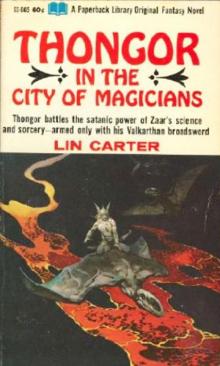 Thongor in the City of Magicians
Thongor in the City of Magicians Thongor at the End of Time
Thongor at the End of Time The Valley Where Time Stood Still
The Valley Where Time Stood Still Journey To The Underground World
Journey To The Underground World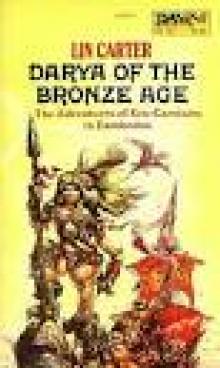 Darya of The Bronze Age
Darya of The Bronze Age Eric of Zanthodon
Eric of Zanthodon Hurok Of The Stone Age
Hurok Of The Stone Age Tower Of The Medusa
Tower Of The Medusa Thongor Fights the Pirates of Tarakus
Thongor Fights the Pirates of Tarakus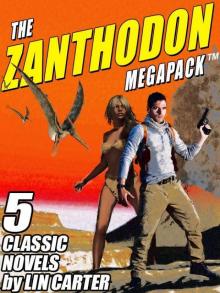 The Zanthodon MEGAPACK ™: The Complete 5-Book Series
The Zanthodon MEGAPACK ™: The Complete 5-Book Series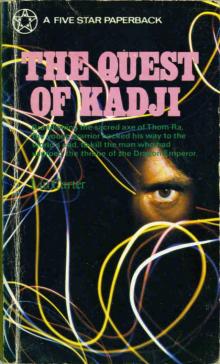 The Quest of Kadji
The Quest of Kadji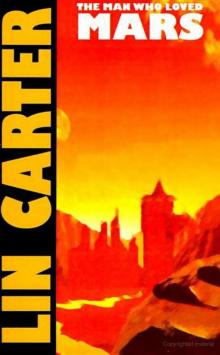 Lin Carter - The Man Who Loved Mars
Lin Carter - The Man Who Loved Mars Thongor and the Wizard of Lemuria
Thongor and the Wizard of Lemuria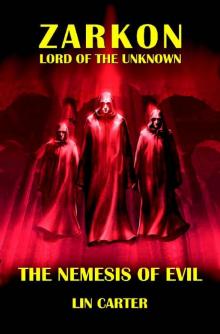 The Nemesis of Evil
The Nemesis of Evil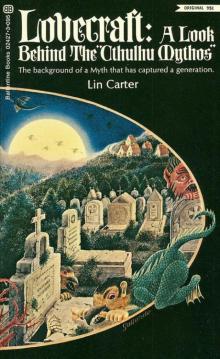 H.P.Lovecraft: A Look Behind Cthulhu Mythos
H.P.Lovecraft: A Look Behind Cthulhu Mythos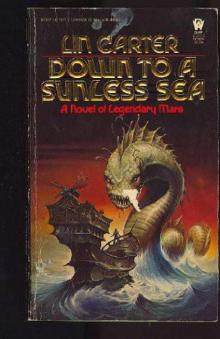 Lin Carter - Down to a Sunless Sea
Lin Carter - Down to a Sunless Sea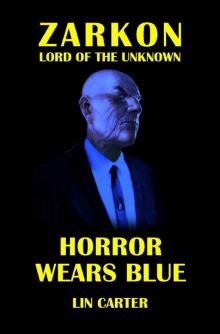 Horror Wears Blue
Horror Wears Blue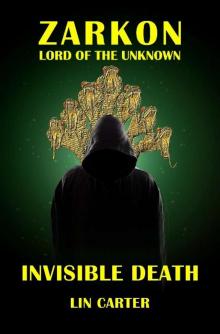 Invisible Death
Invisible Death Lin Carter - The City Outside the World
Lin Carter - The City Outside the World The Volcano Ogre
The Volcano Ogre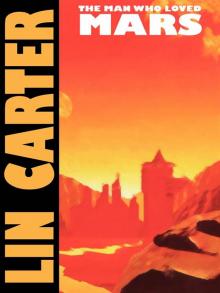 The Man Who Loved Mars
The Man Who Loved Mars